Farm and Food Systems Newsletter — January 2020
In this issue:
- High Tunnel Tomato On-Farm Research Project Seeks Growers
- Greenhouse Plastic Recycling Program Available Through UMaine Extension
- Resources for Managing Farm Stress
- 2020-2021 New England Vegetable Management Guide Available
- Sprayer/ Spreader Calibration Assistance and Resources
- USDA Announces Pilot Insurance Coverage for Hemp Growers
- 2020 Crop Insurance Deadline Approaches
- Advanced EQIP Payment Option for Historically Underserved Producers
- Value-Added Producer Grant Program Offers $37 Million in Funding
- Impacts of Food Safety Practices
- Agritourism and Direct Sales Survey
- Survey of Crop Damage Due to Birds.
High Tunnel Tomato On-Farm Research Project Seeks Grower
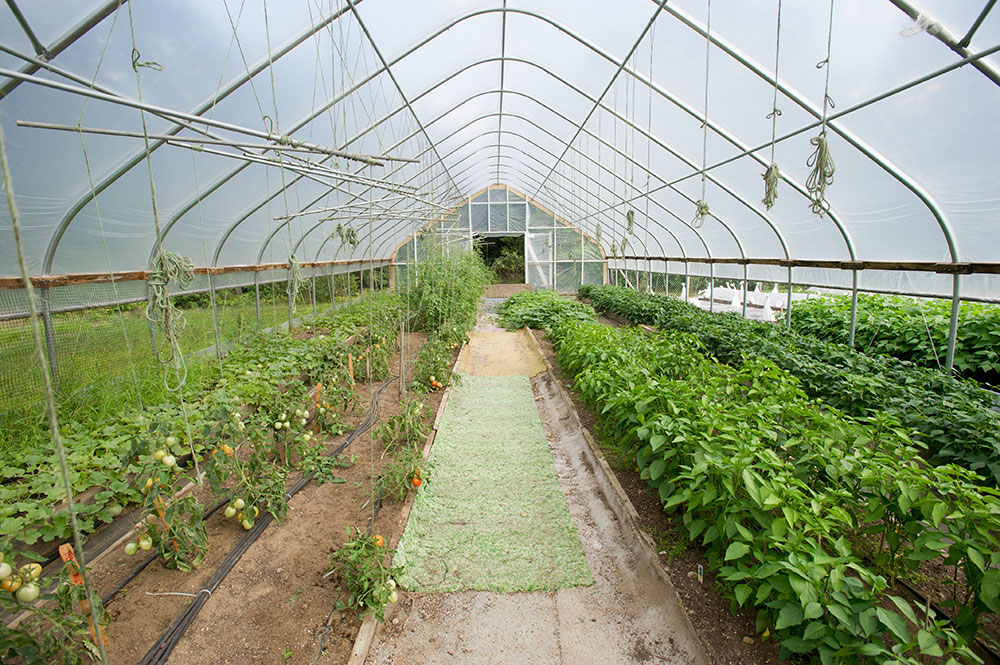
A research group from the University of Vermont is inviting growers in Vermont, New Hampshire and Maine to participate in a 2-year study to improve our understanding of the fertility needs of high tunnel tomatoes grown in the ground. The project will pay for soil tests at the UMaine lab and provide customized fertilizer recommendations for your tunnel(s). Growers must agree to grow at least one bed of red, indeterminate slicing tomatoes, follow the soil test recommendations, and track yields. If interested, please review the participant agreement (Word) for details and then contact Becky Maden with questions or to sign up, contact Becky at (802) 773.3349 x 277 or rebecca.maden@uvm.edu, preferably by the end of January.
Greenhouse Plastic Recycling Program Available Through UMaine Extension
University of Maine Cooperative Extension has been awarded $38,764 by a one-year State of Maine Department of Environmental Protection Waste Diversion Grant to develop a statewide pilot program to recycle agricultural greenhouse plastic. The program’s goal is to collect at least one-third of Maine’s annual waste greenhouse plastic, and partner with an end-user who can convert the collected plastic into resin feedstock used in the manufacture of new plastic products.
Visit this site for more information about this program, including drop-off sites near you.
Resources for Managing Farm Stress
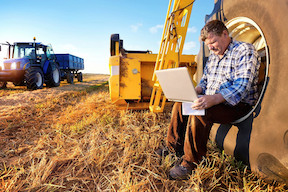
There are several programs available to help farmers dealing with high levels of stress and mental health issues. Here is a list of mental health and stress management resources compiled by the Maine AgrAbility program.
The Maine Agricultural Meditation Program is available to help farmers work through tough issues like communication and planning with farm family members, neighbor disputes, or credit counseling. Find more info about the program here
211 Maine is a phone call center for Mainers in Crisis. If you or someone you love is in need, call 211 on your phone to speak to a crisis specialist, or go to this online searchable site for local resources. This resource is available 24/7.
Another farm specific source of one-on-one assistance is the Farm Aid Farmer Services team. Their Online Request for Assistance form is here, or, you can call the farmer hotline at 1-800-FARM-AID (1-800-327-6243). Farmer Services staff answer the hotline Monday through Friday from 9:00 a.m. to 5:00 p.m. eastern time.
If you or someone you know is in an emergency, call The National Suicide Prevention Lifeline at 800-273-TALK (8255) or call 911 immediately.
2020-2021 New England Vegetable Management Guide Available
A collaborative project of the Cooperative Extension vegetable programs in the six New England States, this guide provides both conventional and organic commercial vegetable growers, on small and large farms, with up-to-date production and pest management information.
Purchase copies of the Guide at the UMass Extension Bookstore. Purchases can be made online or by printing your confirmation and mailing it in with a check. You can also order by phone: (413) 545-2717.
Buy the Guide by itself, or as a package with the NE Vegetable & Strawberry Pest ID Guide. The Pest ID Guide contains over 200 full-color images of the weeds, insects, diseases, and disorders that may be affecting your crops, and beneficial insects too. The Pest ID Guide is an indispensable companion to the Veg Guide, and you save big when you buy them together!
Guide pricing:
2020-2021 New England Vegetable Management Guide alone: $25.00
Northeast Vegetable & Strawberry Pest Identification Guide alone: $15.00
Veg Guide & Pest ID combo pack: $30.00
Members of the Maine Vegetable and Small Fruit Growers Association receive guides with their membership. This year there is a discounted rate for first time members of $30 for the year. Membership gets you two days at the Trade Show ($10/day without the membership), the New England Vegetable Guide, a spring and fall twilight meeting, a newsletter, representation on the Board of Agriculture and the Agricultural Council of Maine, and representation at the legislature and legislative updates on a variety of things that apply to small farms.
Sprayer/ Spreader Calibration Assistance and Resources
When is the last time you calibrated your boom sprayer? How about a manure spreader or backpack sprayer? Pesticide spray equipment that is not calibrated runs the risk of streaky, or under application, greatly reducing the efficacy of the product and risking build up of pest resistance. You may also be over applying resulting in wasted money and breaking the law (allowable amount of product per application and year (found on the label)).
To help growers improve their pest and fertility management programs, UMaine Extension is offering to send a trained professional to your farm to help calibrate your equipment. Participants must 1) be a commercial farmer, 2) be willing to clean and prepare the equipment prior to the visit, and 3) the equipment operator must participate in the calibration.
For more information about the program and to sign up, contact Caragh Fitzgerald (cfitzgerald@maine.edu – 207-622-7546).
If you prefer to calibrate your own equipment, there a several resources to help you do that at this webpage.
USDA Announces Pilot Insurance Coverage for Hemp Growers
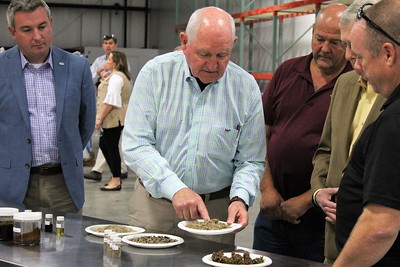
The USDA’s Risk Management Agency has announced that crop insurance will be available for hemp growers. The Multi-Peril Crop Insurance coverage is for hemp grown for fiber, grain or CBD oil for the 2020 crop year. The deadline to enroll for 2020 coverage is March 15, 2020. A list of crop insurance agents is available at all USDA Service Centers and online at the RMA Agent Locator. Learn more about crop insurance and the modern farm safety net at rma.usda.gov.
Contact Erin Roche with the UMaine Crop Insurance Education Program (erin.roche@maine.edu — 207.949.2490 ) with questions.
2020 Crop Insurance Deadline Approaches
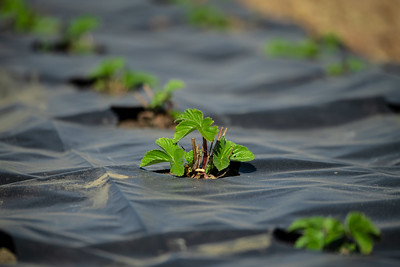
March 15, 2020 is the deadline to enroll, cancel, or change policy coverage for crop insurance on spring-seeded crops in Maine such as corn, sweet corn, barley, oats, spring wheat, and potato. Those producing other, “non-insurable” spring-seeded crops such as tomatoes, pumpkins, squash, etc. may seek coverage through the Non-insured Crop Disaster Assistance Program (NAP) available through the Farm Service Agency. March 15th is also the deadline to enroll in Whole Farm Revenue Protection, a crop insurance policy that protects a farm’s adjusted gross revenue. Locate a private licensed crop insurance agent https://prodwebnlb.rma.usda.gov/apps/AgentLocator/#/
Learn More! Contact Erin Roche, UMaine Cooperative Extension, Crop Insurance Education Professional (949.2490), erin.roche@maine.edu. More information at www.extension.umaine.edu/agriculture/crop-insurance/
Advanced Payment Option for Historically Underserved Producers
Beginning, socially disadvantaged, veteran, and limited resource farmers or ranchers currently participating in the Environmental Quality Incentives Program (EQIP) are eligible for advanced-payment grant funding. Rather than waiting to be reimbursed, qualifying farmers receive funding up-front. Learn more and check eligibility.
Value-Added Producer Grant Program Offers $37 Million in Funding
USDA Rural Business-Cooperative Service is accepting applications for this grant program, which helps agricultural producers enter into value-added activities related to processing and marketing of new products. The goals are to generate new products, create and expand marketing opportunities, and increase producer income. Planning grants are up to $75,000, and working capital grants are up to $250,000. A 50% match is required. Learn more and apply by March 10 (deadline is March 5 for electronic submissions).
Impacts of Food Safety Practices on Overall Farm Operations Survey
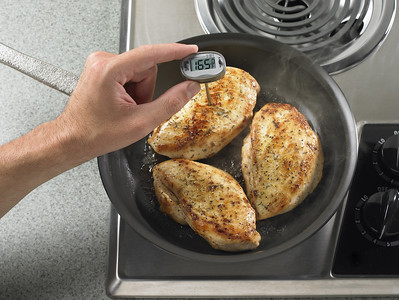
A group of researchers at Cornell University, the University of California, and the University of Rochester are working on a project to understand and model trade-offs between food safety and conservation practices used on fresh produce farms.
The aim of the project is to help farmers develop management plans that minimize costs and optimize food safety and conservation outcomes.
To ensure our models accurately reflect grower practices, costs, and needs, we are conducting a survey among fruit and vegetable growers in the Northeast, Mid-Atlantic, and Southeast. If you are a grower in those areas, and are willing to spend 20 to 30 minutes to take our survey, we would really appreciate your insights.
The survey is 100% anonymous and the first 300 participants will receive a $15 e-gift card. If you are interested in participating please go to https://bit.ly/2t6EQsO or use the QR code below.
Sincerely and Thanks,
Dr. Daniel Weller, University of Rochester
Agritourism and Direct Sales Survey
If you have visitors on your farm, vineyard, or fishery, you are invited to take part in a national survey about agritourism and direct sales. Whether you have a farmstand, u-pick, CSA, tastings, school field trips, events, tours, hunting, overnight stays, or open your farm to the public in any other ways, your experiences are important. This survey is confidential and should take about 10 minutes to complete. Results will be used to develop tools and resources for farmers. The survey is now closed.
The survey will close January 31. Questions can be directed to Lisa Chase, lisa.chase@uvm.edu, 802-257-7967.
Survey of Crop Damages Due to Birds
This survey is for fruit and vegetable growers who are experiencing bird damage issues. It should take less than 5 minutes. The survey can be found here https://riepr.org/s/birds.
UPCOMING EVENTS
See latest newsletter
RESOURCES
Maine Ag Resource Groups:
- Maine AgrAbility: Assists farmers, fishermen, and forest workers to overcome disabilities, injuries or other barriers so they can continue to work safely and productively in agriculture.
- The Beginning Farmer Resource Network is a coalition of Maine agriculture agencies and organizations working together to connect aspiring and beginning farmers to resources for farm business success.
Production Guides:
- Hemp Diseases and Pests: Management and Biological Control (PDF) (Note: It is illegal to use any registered pesticide product on crops not listed on the label.)
- New England Vegetable Management Guide
- Northeast Vegetable and Strawberry Pest Identification Guide
- Guide for Organic Livestock Producers (PDF)
- Maple Business Resources Website
Podcasts:
- SARE’s Our Farms, Our Future podcast series
- More Podcasts at http://blog.uvm.edu/cwcallah/2018/12/17/podcasts-for-agricultural-education-and-insights/
Fact Sheets:
- New UMaine Produce Safety and FSMA Fact Sheet
- Cover Crop Economics. When Do Cover Crops Pay. SARE Bulletin
- (NEW!) Bulletin #5120 Farmer Skill and Knowledge Checklist: What Maine Farmers Need to Know about Pesticides
- (NEW!) Bulletin #7014, Farmer Skill and Knowledge Checklist: Wreath, Garland, and Centerpiece-Makers
Listserv:
- Farmer-to-Farmer Communication for Maine Veg and Berry Growers. Connect with over 200 other growers for production and business discussions, and buying/ selling equipment and products.
Farming Apps:
- Updated SoilWeb App Available from NRCS
DIRECTORIES
- Maine Hay Directory
- Irrigation Suppliers and Design Services (NEW!)
- Compost (PDF)
- Agrichemical and Fertilizer Suppliers
- Lime Suppliers
- What Veterinarians Treat Large Animals (in Maine)?

